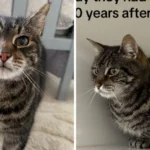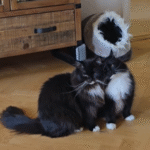Did you ever think your cat could feel heartbreak? The truth might surprise even the most seasoned cat lover. While cats are often seen as mysterious and independent, they are deeply emotional beings who feel loss and sadness in powerful—yet silent—ways. Their grief may not always look like ours, but it’s real and sometimes even heartbreaking to witness. These stories and moments reveal just how quietly, yet profoundly, our feline friends mourn the companions and routines they lose.
Withdrawing From Favorite Spots
One of the most poignant signs of feline grief is when a cat suddenly avoids its favorite spots. Imagine your cat who used to bask in a sunny window, now leaving it untouched for days on end. This withdrawal is often triggered by the loss of a close companion—either another pet or a beloved human. Cats are creatures of habit, and when their world changes, they sometimes respond by distancing themselves from the places that remind them of happier times. Their silence is loudest in these empty spaces. Watching a once-playful cat ignore its cherished nap corner can be as telling as any spoken word. It’s their way of saying, “Something is missing.” This quiet withdrawal is a subtle but clear sign of feline mourning.
Loss of Appetite
A cat who suddenly turns away from its food bowl is sending a strong signal. This isn’t just about being finicky; it can be a profound response to grief. When a cat loses a companion, its entire appetite for life can diminish. The bowl remains full, untouched, day after day—a silent testament to the emotional turmoil within. Owners may worry, coax, or try new foods, but the underlying sadness can overpower even the tastiest treat. This refusal to eat is not just about missing a meal; it’s about mourning what’s been lost. The kitchen, once filled with eager meows, becomes unusually quiet. It’s a heartbreaking, silent cry for comfort.
Sleeping More Than Usual
Grieving cats often retreat into sleep, spending hours curled up in places where they once played. Sleep becomes an escape, a way to avoid the sadness that lingers in the air. Instead of chasing toys or exploring, they seek solace in dreams. This increase in sleep isn’t just laziness; it’s a coping mechanism. Just like people who want to sleep away their worries, cats use rest to shield themselves from pain. Their motionless forms and quiet breathing are gentle reminders of their heartbreak. The house feels emptier, and the silence grows as your cat seeks comfort in the only way it knows—through sleep.
Searching the House
Have you ever seen a cat wander from room to room, pausing to sniff the air or peer into every corner? This searching behavior is a clear sign of feline grief. When a companion suddenly disappears, cats often go looking for them, hoping to find them hiding or waiting. Their silent patrols are both hopeful and tragic—a routine that soon becomes a ritual. Sometimes, a cat will return to places where it used to play or cuddle with its friend, lingering as if expecting a joyful reunion. These silent searches can go on for days or even weeks. It’s their way of holding onto hope, even as their world has changed.
Vocalizing Quietly at Night
While some cats may become more silent in their grief, others express their sadness with soft, mournful cries, especially at night. The house grows still, and suddenly you hear a gentle meow echoing down the hallway. This isn’t a demand for food or attention; it’s a quiet call for the loved one who is gone. These nighttime vocalizations can be particularly haunting, as if your cat is trying to reach out to a friend who’s just out of sight. The sound often fades quickly, replaced by silence, but it leaves a lingering ache in the heart of anyone who hears it. Through these soft cries, cats share their grief in the most touching way.
Clinging to Surviving Family Members
After a loss, some cats seek out the comfort of those who remain. They may become unusually affectionate, curling up in your lap or following you from room to room. This sudden clinginess is their way of finding solace and reassurance. The bond between you and your grieving cat grows stronger as you both navigate the sadness together. These moments of closeness are bittersweet—a reminder of what’s gone, but also of the love that remains. Your cat’s gentle nuzzles and purrs are silent thanks for your presence during this difficult time. It’s a quiet, wordless partnership in mourning.
Ignoring Toys and Playtime
A playful cat who suddenly ignores its toys is saying more than you might realize. The jingle of a ball, once enough to trigger a burst of energy, now goes unanswered. Playtime becomes a distant memory as your cat loses interest in the activities that once brought joy. This lack of enthusiasm is a clear sign of grief. Toys are left untouched, gathering dust in the corner as your cat quietly mourns. The silence during what used to be rowdy play sessions is striking. It’s a subtle, but deeply emotional, expression of loss.
Grooming Excessively
Grieving cats sometimes deal with their emotions by grooming themselves more than usual. This over-grooming can lead to bald spots or irritated skin, but it’s not just a physical issue. It’s a way for cats to soothe themselves when their world feels out of control. The repetitive motion is calming, offering a small sense of comfort in the midst of heartache. As they lick and clean, they are trying to restore some normalcy to their disrupted lives. This self-soothing behavior is a silent signal that your cat is struggling. It’s a quiet, but powerful, act of grieving.
Hiding Away for Long Periods
Sometimes, grief drives cats to seek solitude. They may hide under the bed, in closets, or in other quiet spots for long stretches of time. This behavior is their way of processing loss in their own space, away from the eyes of others. Hiding is not just shyness—it’s a need to be alone with their feelings. The house can feel even lonelier with your cat tucked away, silent and invisible. It’s as if they’re trying to heal themselves, one quiet moment at a time. Respecting their need for solitude is important, but it’s also a reminder of how deeply cats can grieve.
Becoming Unusually Aggressive or Irritable
Grief doesn’t always look like sadness. Sometimes, it shows up as irritability or even aggression. A normally gentle cat may hiss, swat, or avoid interaction altogether. These changes can be confusing, but they are often a silent plea for understanding. The emotional turmoil inside can make your cat lash out, even at those they love. This behavior is not about anger—it’s about confusion and heartache. Their aggression is a shield, protecting their vulnerable hearts. It’s a tough but honest way cats deal with pain, often leaving owners feeling both worried and sympathetic.
Using the Deceased Companion’s Belongings
After the loss of a companion, a grieving cat may seek out the other’s bed, toys, or favorite blanket. They may curl up in the same spot, surrounded by the familiar scent of their lost friend. This quiet tribute is both touching and heart-wrenching. It’s as if your cat is trying to hold onto the memory of what once was. These moments are a silent acknowledgment of the bond they shared. The sight of your cat nestled in a place filled with memories can tug at your heartstrings. It’s a gentle, wordless way of saying goodbye.
Taking on the Habits of the Lost Companion
In a surprising twist, some grieving cats begin to mimic the behavior of their lost friend. A cat who never sat on the windowsill may suddenly start doing just that, as if filling the empty space left behind. This adoption of habits is a quiet tribute—a way of keeping the memory alive through daily routines. It’s both comforting and bittersweet, watching your cat step into the role that’s been left vacant. These changes may be subtle, but they speak volumes about the depth of your cat’s grief. It’s their way of honoring the friend they miss, in the only way they know how.

Linnea is a born and bred Swede but spends as much time as possible in Cape Town, South Africa. This is mainly due to Cape Town’s extraordinary scenery, wildlife, and atmosphere (in other words, because Cape Town is heaven on earth.) That being said, Sweden’s majestic forests forever hold a special place in her heart. Linnea spends as much time as she can close to the ocean collecting sea shells or in the park admiring puppies.






